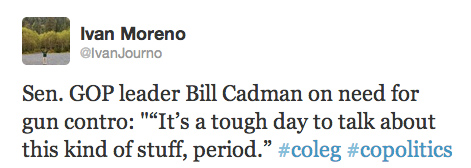Top Ten Stories of 2012 #5: Aurora and the Changing Politics of Guns
Between now and New Year’s Eve, Colorado Pols is recapping the top ten stories in Colorado politics from the 2012 election year.
As a Western state with a frontier culture and independent values, Colorado’s natural tendency toward individual freedom has always meant a permissive attitude toward gun ownership.
At the same time, tragic events in our state have put us at the forefront of the national debate over gun policy–somewhat belatedly, after the issue caught up with us in the wake of recent tragedy both here and elsewhere. In 1999, the entire nation was shocked by a mass murder at Columbine High School in Littleton, at that time the worst school shootings in American history. In the aftermath of that tragedy, Coloradans passed Amendment 22, closing the “gun show loophole” by requiring background checks be carried out by private sellers at gun shows.
After that modest defeat, the state’s highly vocal gun lobby, led by an organization called the Rocky Mountain Gun Owners, who considers the National Rifle Association too soft, aggressively fought back–pressuring Colorado Republicans to reject even the most rudimentary tightening of gun laws in the harshest terms possible. The gun lobby won a victory earlier this year when the Colorado Supreme Court overturned a University of Colorado ban on carrying licensed concealed weapons on campus.
And then, early on the morning of July 20th of this year, a disturbed University of Colorado graduate student walked into a movie theater in Aurora, and took the lives of 12 innocent people using an assault rifle and a shotgun while injuring dozens more.
Immediately after the Aurora shootings, even most Colorado Democrats were unwilling to call for a plan to reduce gun violence–either spectacular tragedies of this kind, or the dozens of people killed every day by gun violence. Gov. John Hickenlooper adopted a very NRA-like deferential tone when he said after Aurora that those intent on violence are “going to find something,” meaning some kind of weapon even if they can’t get a gun.
From that time, mass shooting incidents have killed or seriously injured 46 more people, including the most recent massacre of 20 children at an elementary school in Newtown, Connecticut. These high-profile incidents have forced attention once again on the 34 people killed every day by gun violence, and seem to be fundamentally changing the nature of this debate. The resulting shift in the narrative was apparent in the contrast between Governor Hickenlooper’s statements in July, against his very different comments this month after Newtown–and his announced support for new measures to ease access to mental health services, and keep guns out of the hands of the mentally ill.
Echoed by polls showing broad support for common sense measures to reduce gun violence without infringing on the rights of law-abiding citizens, Colorado Democratic lawmakers are following Hickenlooper’s measured call to action with a number of proposals expected to be debated in 2013. As specific gun safety proposals shake out in Colorado’s General Assembly, it’s clear that the self-serving cycle of declaring it “too soon” after a tragedy to talk about reform, which too often resulted in no action ever being taken, has been broken. The gun lobby looks weaker than ever, and at least in Colorado, Democrats appear interested in a sensible balance that both improves public safety and preserves our values.
This can be fairly considered a major and politically unexpected development.




 This irrational radicalization of the grassroots right wing
This irrational radicalization of the grassroots right wing